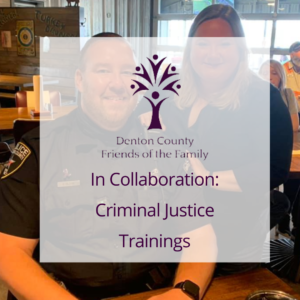In Collaboration: Criminal Justice Trainings
Building Positive Experiences for Victims

Below are the current trainings available to Law Enforcement. Want to build a custom training, have questions, or are ready to bring these to your department? Email Lori Nelson at lnelson@dcfof.org
Stalking Investigations
One in three women and one in six men will be stalked in their lifetime. Divided into six short video segments and discussion guides, this training shows how to effectively uncover and document common tactics used by these dangerous offenders. By understanding “SLII” tactics, implementing risk assessment tools, and charging stalking at every opportunity, first responders can provide victims of this minimized and often overlooked crime more paths to safety and justice.
Training time: 6 15-20-minute trainings (ideal for briefings) or 1 2-hour training
Determining Predominant Aggressor and Self-Defense
Domestic violence calls are some of the most dangerous and complicated scenes that officers encounter. Responding officers must understand the context of these crimes and conduct thorough, evidence-based investigation to determine if self-defense was present, who acted as the predominant aggressor, and who should go to jail. Arresting the wrong party can have devastating consequences not only for the victim, but for the criminal justice system’s ability to hold the offender accountable.
Training time: 6 15-20-minute trainings (ideal for briefings) or 1 2-hour training
Strangulation Investigations
The use of strangulation as a form of domestic violence is an undeniable red flag for future violence and homicide—not only for the victim, but our communities as a whole. Although strangulation is a felony in Texas, this crime is too often overlooked due to elusive evidence and the already complicated dynamics of domestic violence crimes. It is imperative that our criminal justice system has the training and tools to hold society’s most dangerous offenders accountable.
Training time: 6 15–20-minute trainings (ideal for briefings) or 1 2-hour training
Trauma-Informed Framework For Working With Victims
Understanding trauma’s impact on the brain is vital for effectively responding to the traumatized victims we encounter every day. Without a trauma-informed framework, a first responder can unwittingly become the first link in a long chain of re-traumatizing individuals, processes, and events that victims often find themselves navigating. By recognizing the impact of trauma and helping victims of crime feel heard within the criminal justice system, we can increase the rate of success in investigating and prosecuting sexual assault and domestic violence cases.
Training time: 5 15–20-minute trainings (ideal for briefings) or 1 1.5-hour training
DCFOF Services Overview for Law Enforcement and Community Partners
Research tells us that only 4% of victims who have been killed by an intimate partner had ever availed themselves of the services of a domestic violence service provider. The ability to provide comprehensive victim services is a critical protective strategy in intimate partner homicide prevention. This training addresses how to respond to victims of domestic and sexual violence, an overview of the services provided by Denton County Friends of the Family, and how to connect victims to support services.
Training time: 30-60-minutes
